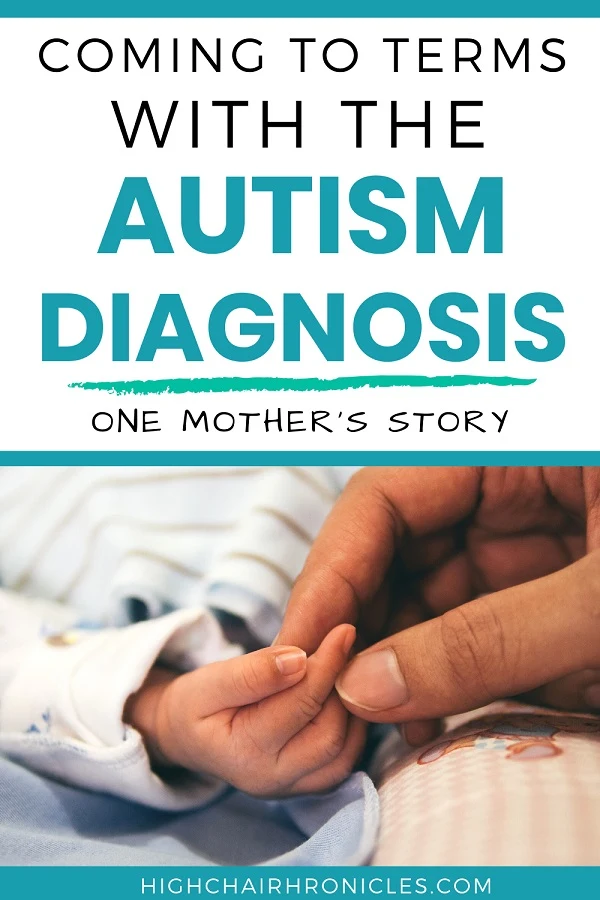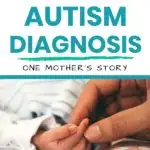One mother's story about coming to terms with her son's Autism diagnosis - from the first instinct that something was off to the testing, diagnosis, and what she is doing to create a support system for herself and her community.

I want to share with you a very special blog post where I interviewed my friend Letitia.
Letitia tells the story of her toddler son's Autism diagnosis. She shares her raw, honest feelings about the whole experience and what she is doing to start a conversation and help other parents in her community on Grand Bahama Island.
I know Letitia through my husband's job and her son happens to go to the same occupational therapist that my son goes to for feeding therapy.
Letitia recently started a Facebook page Color me Au-Some because she wanted to create a space where parents who are going through the same experiences can see that they are not alone, that there are others out there who get what they are going through. Go follow her page on Facebook, or share it with a friend.
I reached out to her because I wanted to share her story and share with you everything she is doing with her son to help his development. This is part 1 of a series of blog posts. In this article, Letitia answers the following question:
Tell me your story and the goal of Color me Au-Some
Letitia recorded her response as a video and I transcribed it below. If you prefer watching over reading, please watch her video here:
From the beginning
Going back, as a mother, I knew there were some things that weren't spot on for my son Teygen. Not to say that I am putting him on a timeline or anything, but there are certain markers that pediatricians would ask for, certain timelines my son wasn't meeting. I knew certain things were a little off. Not to say wrong, but just not spot on.
I knew there was a possibility of the spectrum. He was falling into the typical symptoms of being on the spectrum.
Speech delay and ear infections
Teygen had chronic ear infections so we had his adenoids removed at the Miami Children's Hospital. In my mind, I thought Teygen was going to pick up words after that, and everything was going to be great. His problems were socializing and not making eye contact. Those could be caused by not hearing properly.
He had the surgery, but he didn't pick up words like I thought he would.
I put it in the back of my mind. I was in denial a little bit. A year after the surgery, we went back to have the tubes removed. When we saw the ENT, the ENT said he was going to refer him to a neurologist. He said, "in all my years of working with kids, I can tell there is something going on with him. Now I am not a neurologist, but I can tell. I've dealt with a lot of kids and I could tell he is somewhere on the spectrum. "
Automatically I got defensive. I knew this in my head but I just didn't want to hear it from someone else.
I started questioning him, saying "you're not a neurologist, how could you tell me something like this?"
Getting the diagnosis
Teygen went to the neurologist the next day at Joe DiMaggios's Children's Hospital in Florida. When we went to the neurologist we got a survey to fill out. The whole team of neurologists came in, asked their questions, and observed Teygen.
During their observation, they pointed out things that I didn't even know, things I didn't read about, like looking at his size, looking at his head circumference.
They told me he is on the spectrum. They said it so casually, so cavalier. They said he was on the spectrum, but it doesn't predict his future, doesn't predict his life.
They suggested we do further testing, such as micro array analysis, Fragile X Syndrome, and they started explaining what all those things mean.
It was a lot. I just broke down in the neurologist's office: "You are telling me a whole lot of nothing. All of the stuff that I didn't want to hear."
Searching for a support system
When I came home to Grand Bahama, I was searching for a support system. Most people don't know how to support something like this. Families try. Friends try. But most fall short.
Now Teygen is going to occupational therapy, going to speech therapy, and making amazing progress. But at the time, I took it like a death sentence, the end of the world.
Why did I take it like that? As a mother, you have it in your mind what you expect is going to happen in your child's life, things you want for them.
Worrying about the future
The diagnosis is not necessarily something anyone wants, so in my mind I am thinking of him getting bullied in school, not being able to keep up with other children, not enjoying life to the fullest, being delayed and missing out on a lot.
I spiraled out of control for a long time. I couldn't function. Anyone who just asked me about Teygen, just in passing, I just rattled it off. I was never embarrassed to say it, but I was hurt.
I was looking for support. Anyone who would say the right thing, such as "oh my child is on the spectrum and he is doing great! He just made this achievement and he is speaking and all that stuff."
Speaking is so important to me. I want my child to be able to tell me if someone did something to him, what he wants, "I love you mommy." I needed that.
Autism is not a death sentence
It's not a death sentence. It really isn't. But I don't think anyone is able to support you the way someone who has gone through it, who has felt it, who has rode the waves and the emotional roller coaster can support you. So that's what the Facebook page Color me Au-Some is about.
Starting the conversation about Autism - Color me Au-Some
What I am going to do is not only start a conversation about Autism.
Everybody knows our options in Grand Bahama are very limited. The resources are very limited. Kids tend to get shortchanged. It's a hard transition for mothers, parents, caregivers, and friends. People tend to say "oh he's fine, he's being a toddler." It's not the same. Anyone with a child on the spectrum will tell you it's not the same.
There's a difference between a toddler tantrum, and a tantrum triggered by being on the spectrum. See, a toddler tantrum tends to stop when they get what they want. You give them the candy, they stop. You walk away and stop paying attention, they stop.
An autistic tantrum tends to go on for hours, nonstop. I can't say Teygen has ever had those long tantrums. His tantrums are not horribly long, but when he is in the middle of one there is nothing you can do.
Changing the narrative around Autism Spectrum Disorder
I just want to start the conversation and change the narrative surrounding Autism Spectrum Disorder. It's not fair for our kids to grow up in society where so many are so ignorant about it.
The worst part of the whole experience for me has not been anything that happened with Teygen. Yes, he struggled with his eating, he struggled with his social skills, but we worked past most of it. (Read about it in Part 2 of the interview with Letitia!)
The hardest part was the adults, the society who are so unwilling to start the conversation. It's so taboo, we don't talk about it. So many people in society have brothers and sisters and children that you don't know about it, because it's a family secret, we don't talk about it, we leave it hidden.
We need to stop that. These are people. These are children. They have hearts, they have soles, they have personalities that are amazing and their potential is unlimited.
I just want to find resources for the Autism spectrum assistance to Grand Bahama in particular, change the narrative surrounding ASD.
I don't want acceptance. It's not a disease that you have to accept. Someone with the autism spectrum is here. We love them. They see the world that we don't see.
I want inclusion. Let's just change the story line. There are so many parents who deal with children on the spectrum who feel shame.
Shame. That has been expressed to me recently. It's sad. Why should they be made to feel embarrassed or ashamed over a situation they have no control over?
It's horrible. All in all, start the conversation. Let's get it out there.
These kids are seeing life different from the way you and I see it. They're gifted. They're talented. They're loving, affectionate people who have certain challenges that can be worked through if intervention is given early and we're consistent with it.
Thank you Letitia!
I appreciate the honesty and the insight into your story and learning to accept your son Teygen's Autism diagnosis. I can only imagine all the thoughts racing through your head during the whole process. It's so brave of you to share this with the world.
Your Facebook page Color me Au-Some is a great place for parents to connect with other parents going through this and see that there are other who understand exactly what they are going through. If you haven't clicked over to the page yet, go check it out and follow it.
Part two of Letitia's story
In part two of this series, Letitia talks about the occupational therapy her son is receiving, the importance of finding an OT who will be your biggest cheerleader, the ways she finds opportunities to incorporate therapy into every-day life for her son, and her son's AMAZING progress over the last year!
Read part 2: Occupational therapy for toddlers with Autism.
Did you find this helpful? Do you know other parents who would find this helpful? If so, please share this and save this to Pinterest using the share buttons at the bottom of the blog post.



Shannon
Wednesday 14th of September 2022
I love this! ❤️ I felt it that raw also. I've always said I love my kids a little too much and thus was devastating. No one understood no matter how hard they tried. My child was diagnosed with leukemia years after hi is diagnosis and his ASD diagnosis was still harder. I'm glad this is being talked about
Kate
Wednesday 21st of September 2022
Hi Shannon, thank you for taking a minute to leave your comment. You and your child have been through a lot. I hope he is healthy now. Hang in there!